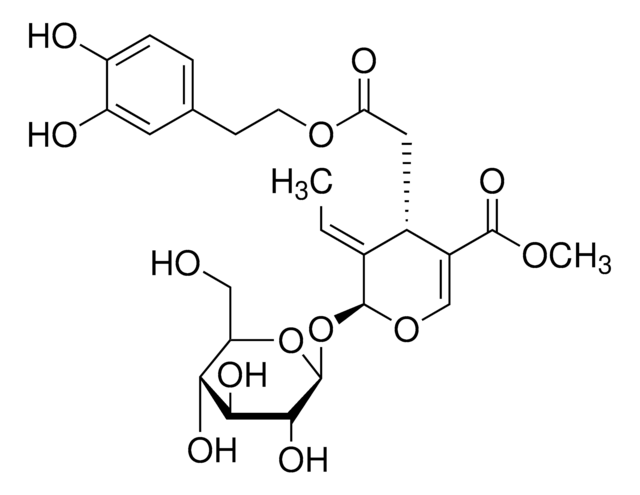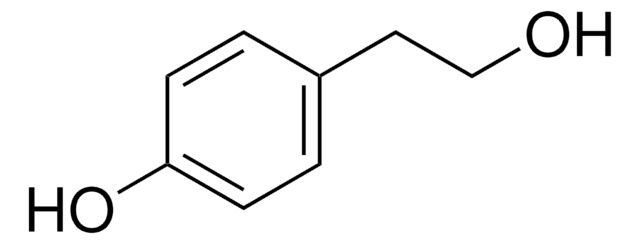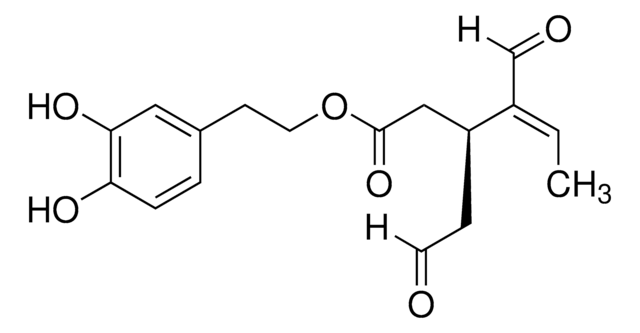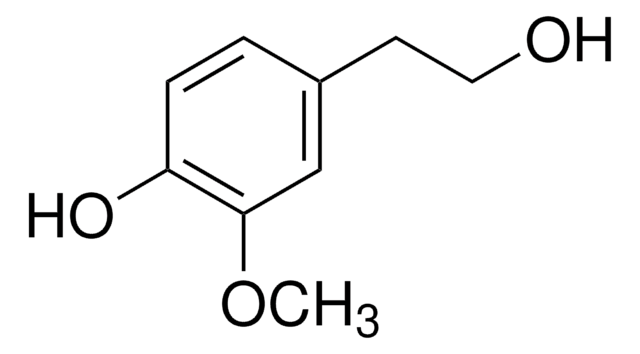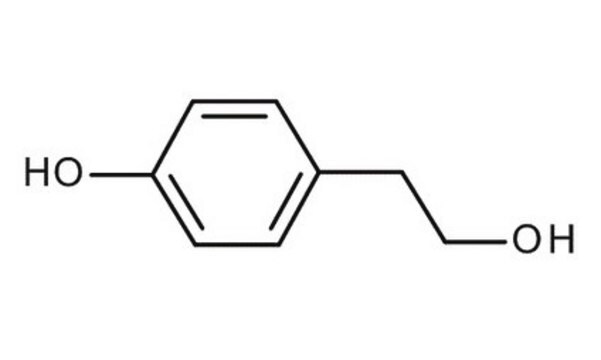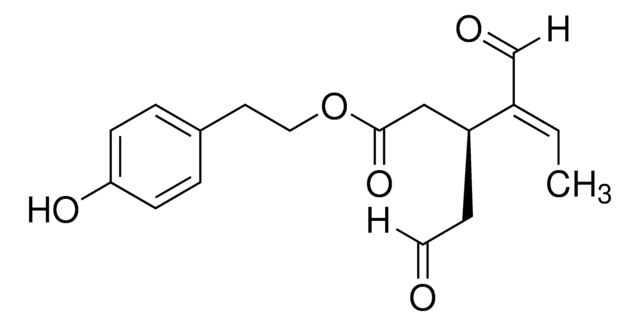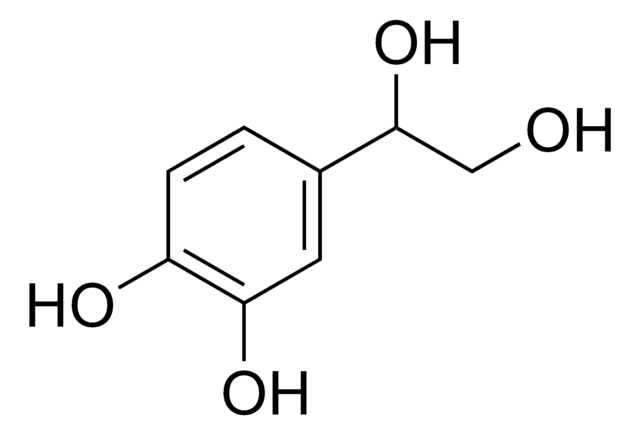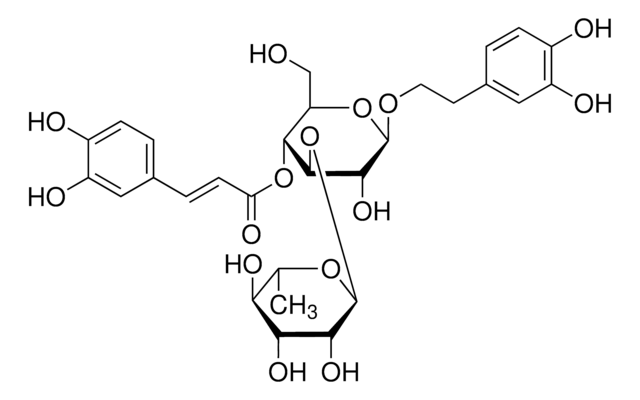H4291
3-Hydroxytyrosol
≥98% (HPLC)
Synonym(s):
2-(3,4-Dihydroxyphenyl)ethanol, 3,4-Dihydroxyphenethyl alcohol, DOPET, Homoprotocatechuyl alcohol
Sign Into View Organizational & Contract Pricing
All Photos(3)
About This Item
Empirical Formula (Hill Notation):
C8H10O3
CAS Number:
Molecular Weight:
154.16
Beilstein:
2208118
MDL number:
UNSPSC Code:
12352205
PubChem Substance ID:
NACRES:
NA.25
Recommended Products
Quality Level
Assay
≥98% (HPLC)
storage temp.
−20°C
SMILES string
OCCc1ccc(O)c(O)c1
InChI
1S/C8H10O3/c9-4-3-6-1-2-7(10)8(11)5-6/h1-2,5,9-11H,3-4H2
InChI key
JUUBCHWRXWPFFH-UHFFFAOYSA-N
Looking for similar products? Visit Product Comparison Guide
Application
- Production of 3-Hydroxytyrosol from Glucose by Chromosomally Engineered Escherichia coli by Fed-Batch Cultivation in a Jar Fermenter.: Demonstrates biotechnological production of 3-Hydroxytyrosol using genetically modified E. coli, highlighting scalable methods for synthesizing valuable biochemicals from simple sugars (Koma et al., 2023).
- Green Extraction of Antioxidant Compounds from Olive Tree Leaves Based on Natural Deep Eutectic Solvents.: Investigates eco-friendly extraction methods for recovering 3-Hydroxytyrosol from olive leaves, emphasizing sustainable chemical processes and the high antioxidant potential of the extracts (Mir-Cerdà et al., 2023).
Biochem/physiol Actions
Metabolite of oleuropein. Antioxidant. Inhibits the rate of cancer cell proliferation and induces cancer cell apoptosis.
related product
Product No.
Description
Pricing
Signal Word
Warning
Hazard Statements
Precautionary Statements
Hazard Classifications
Acute Tox. 4 Oral
Storage Class Code
10 - Combustible liquids
WGK
WGK 1
Flash Point(F)
Not applicable
Flash Point(C)
Not applicable
Choose from one of the most recent versions:
Already Own This Product?
Find documentation for the products that you have recently purchased in the Document Library.
Customers Also Viewed
Laura Rubió et al.
Food chemistry, 134(2), 1132-1136 (2012-10-31)
We report progress in the study of olive oil phenolic metabolites in humans and identify a new hydroxytyrosol metabolite called hydroxytyrosol acetate sulphate, which was determined using tandem MS, after ingestion of 30 ml of olive oil with a high
Ghayth Rigane et al.
Journal of food science, 77(10), C1077-C1083 (2012-09-04)
A very simple method is proposed to produce hydroxytyrosol, a commercially unavailable compound with well-known biological properties which justify a potential commercial application. The 2-phase Chemlali olive pomace is selected as substrate for chemical treatment. Different conditions of chemical treatment
Yasuharu Satoh et al.
Metabolic engineering, 14(6), 603-610 (2012-09-06)
The hydroxylation of tyrosine is an important reaction in the biosynthesis of many natural products. The use of bacteria for this reaction has not been very successful due to either the over-oxidation to ortho-quinone when using tyrosinases from bacteria or
Haloom Rafehi et al.
Journal of dietary supplements, 9(2), 96-109 (2012-05-23)
Olive oil, an oil rich in monounsaturated fatty acids (MUFCs) and minor constituents including phenolic compounds, is a major component of the Mediterranean diet. The potential health benefits of the Mediterranean diet were highlighted by the seminal Seven Countries Study
Anna Sgarbossa et al.
Chemico-biological interactions, 199(2), 87-95 (2012-06-28)
Phenylpropanoids have several highly significant biological properties in both plants and animals. Four phenylpropanoid glycosides (PPGs), verbascoside (VB), forsythoside B (FB), echinacoside (EC) and campneoside I (CP), were purified and tested for their capability to activate NRF2 and induce phase
Our team of scientists has experience in all areas of research including Life Science, Material Science, Chemical Synthesis, Chromatography, Analytical and many others.
Contact Technical Service
